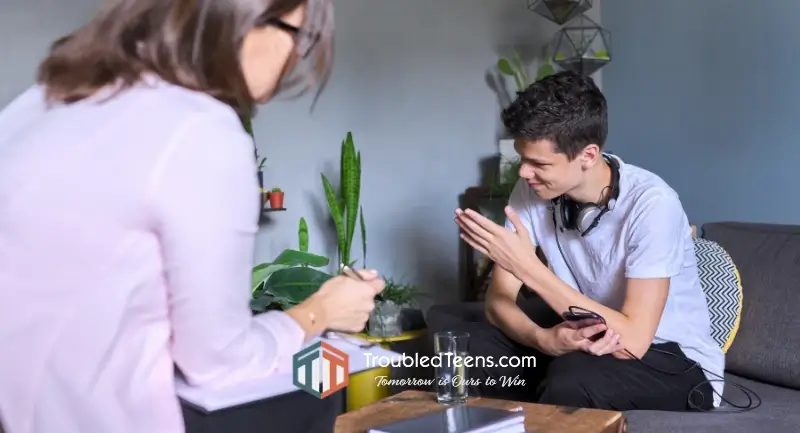Updated on October 26, 2023
30% of teenagers feel pressured by their peers to use drugs.1
One of the many concerns parents of teens worry about is what kind of friends their child will choose and if they should intervene when they don’t approve of them. Parents understand the power of peer pressure.
They remember how important it was to be popular when they were in high school and viewed as a “cool” person. They also remember risky behaviors they probably wouldn’t have done if it wasn’t for peer pressure and that all-consuming need to be accepted by their peers.
The Science Behind the Adolescent Response to Peer Influence
Rapid brain development in teens involves the dopamine-regulated reward system and the surge of hormones and certain neurotransmitters that make teens highly sensitive to social situations and relationships.
Research shows that teens between the ages of 13 and 17 spend much more time interacting with friends than they do with family members. In addition, teens report feeling happier and upbeat when in the presence of their peers.
Such accelerated changes within the adolescent brain also make them vulnerable to mental illness and teen substance abuse. Nearly 75 percent of adults with persistent depression, substance addiction, anxiety disorders, and schizophrenia report that they initially began experiencing symptoms before age 24.
Certain risk factors may predispose some teens to be more vulnerable than other teens to peer pressure. Identifying whether their child has the following characteristics can help parents become more aware of signs of possible teen substance abuse involving peer pressure:
-
- High sensitivity to slight criticisms or perceived criticisms
-
- Putting peer acceptance and popularity as a top priority in their lives
-
- Preoccupation with appearance that consumes much of their time
-
- Having low self-esteem and low self-worth
-
- Constantly comparing themselves to the “popular” kids at school
-
- Questioning their gender identity/exploring LGBTQ identities
-
- Associating with known drug-using peers
-
- History of academic difficulty
-
- Having family members (especially older siblings) who abuse drugs and alcohol
Prevention techniques for minimizing the chance that peer pressure will compel a teen to take drugs or drink alcohol focus on communicating calmly but firmly with your child, monitoring social media use, and having frank discussions about the consequences of caving into peer pressure.
The area of the brain involved with rational, forward-thinking processes does not fully mature until teens are in their mid-twenties.
Consequently, adolescents are mostly incapable of considering the ramifications of risk-taking behaviors that they feel compelled to do when in the company of their peers.
Informing them of the consequences of substance abuse can be considered a kind of teaching moment they will hopefully reflect on and use before submitting to peer pressure.
Peer Pressure and Social Media
Social media sites like Instagram and TikTok have only heightened teen fears about being “left out” and ignored by peers. Moreover, the obsession with how many “likes” a teen gets from posting a picture of themselves has hyper-connected the need for acceptance and buckling to peer pressure.
When teens depend on social media to feel less insecure about their popularity, they are relying on the “likes” of people they have never met, as well as familiar peers.
Before social media existed, teens would have to interact in person with peers before they might feel compelled to smoke a joint, drink a beer, or take pills. Today, they can be alone with their cell phone or laptop to experience online negative peer pressure 24/7.
Seeing other teens receive compliments and thousands of “likes” from posting pictures of themselves drinking alcohol and doing drugs activates the underdeveloped reward system in the teen brain.
To relieve extreme social anxiety and the fear of not having the approval of peers, teens are more likely to use drugs and alcohol due to social media peer pressure.
6 Tips for Parents Dealing with Teen Substance Abuse and the Fallout From Peer Pressure
1. Ask your teenager if they really want to be a substance abuser. Be honest about what you see as the consequences of peer pressure but don’t lecture.
Let your teen know that whatever they tell you will not result in them getting in trouble. Give as much unconditional support and love as possible.
2. Discuss what happens to teens and adults who become addicted to drugs or alcohol. If a family member has been through the addiction and recovery process, use their real-world experiences to emphasize that what you are saying is factual.
Don’t rely on scare tactics or overdramatizing. Teenagers know when a parent is trying to intimidate them with misleading narratives.
3. If you think your teen saw something on social media that precipitated their experimenting with drugs, ask them why they think substance abuse will improve their standing with peers. Keep prompting your child to speak by taking statements they make and turning them into questions.
For example, if your teen says, “Everybody likes Macy because she smokes pot and is so cool about it,” counter that remark with, “What exactly makes Macy look cool when she’s smoking pot? I don’t know the answer to that, and I really want to know”.
4. Establish household rules and stick to those rules. If you expect your teen to be home by midnight on the weekends, don’t allow your teen to make excuses for being late.
Inconsistent discipline is a leading reason why adolescents find it easier to give in to peer pressure.
5. Parents have every right to know who their teenager’s friends are and who will be attending parties that their teen attends. Never feel guilty if you ask your teen who they are hanging out with after school or on the weekends.
Teens who refuse to answer may be concealing something that they know their parents will disapprove of.
6. Keep the lines of communication open and free of judgmental attitudes towards your teen. Always remember that your child is enduring one of the most difficult life transitions they will ever experience and needs an unending amount of love, support, and understanding from their parents.
When it comes to finding the right residential treatment center for your troubled teen, it can be overwhelming. With so many options available, it can be difficult to know which one is the best fit for your child.
That’s why it’s important to take the time to research and understand all of your options. By doing so, you can make an informed decision that will help your child get the care they need.
Sources:





















